Abstract
1. Experimental hypertension in the rat, induced either by renal artery stenosis or by treatment with deoxycorticosterone acetate (DCA) developed maximally over a period of 8 weeks. In both types of hypertension the rate of development was unaffected by immunosympathectomy or by chemical sympathectomy following the administration of 6-hydroxydopamine.
2. The effect of 6-hydroxydopamine on chronic renal hypertensive rats was to produce a hypotensive action of longer duration than when similarly administered to DCA-induced hypertensive or normotensive rats. Reserpine (5-10 mg/kg intraperitoneally) produced a more marked hypotensive effect on both types of hypertensive rats although it was of much shorter duration.
3. It is concluded that experimental hypertension of renal origin or induced by DCA treatment can develop even though most of the sympathetic nervous system has been destroyed. The maintenance of chronic hypertension in these conditions may depend on the adrenal glands or a hormonal system as yet undetected.
Full text
PDF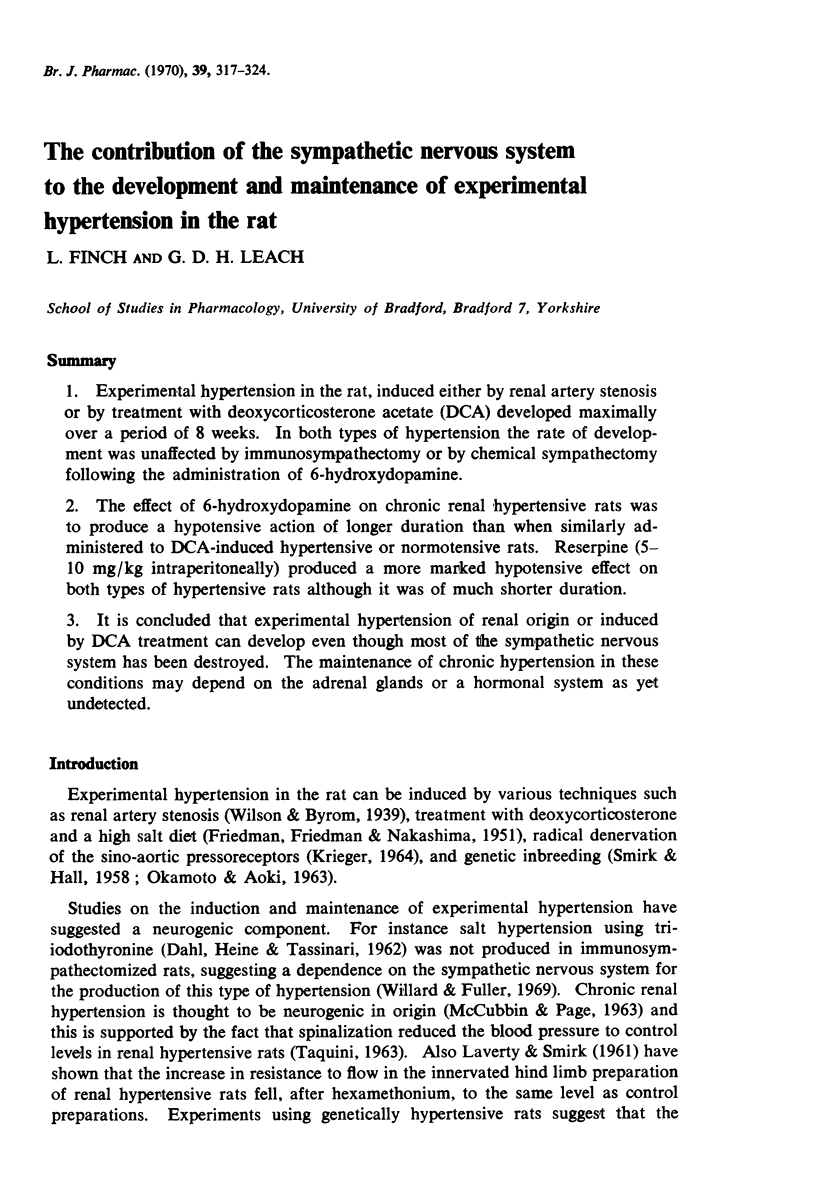
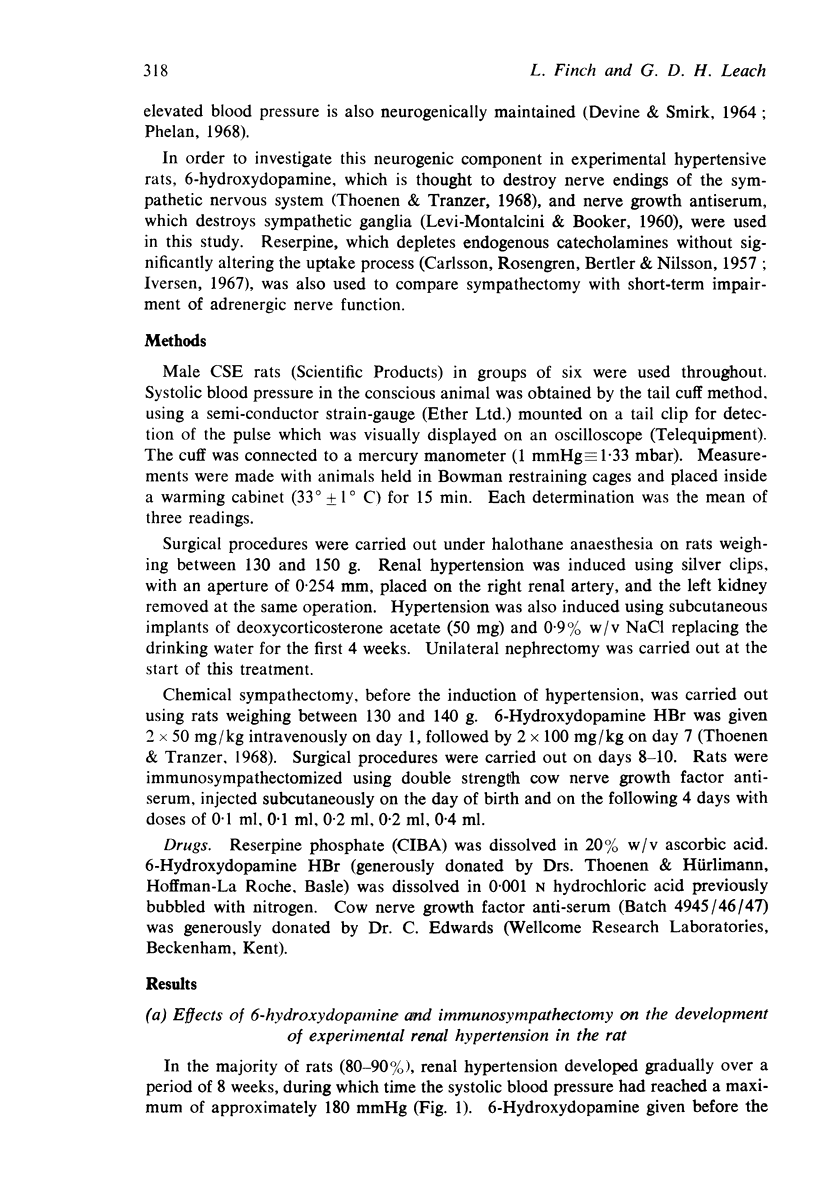
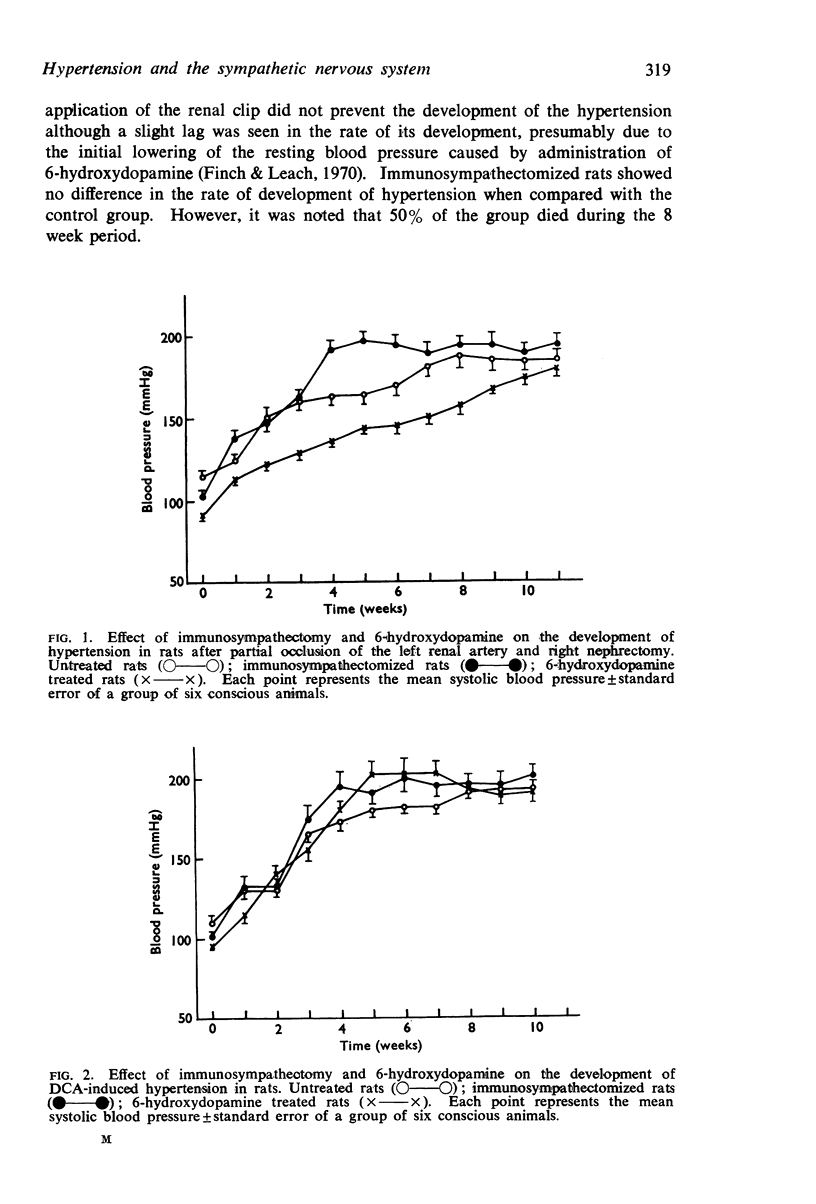
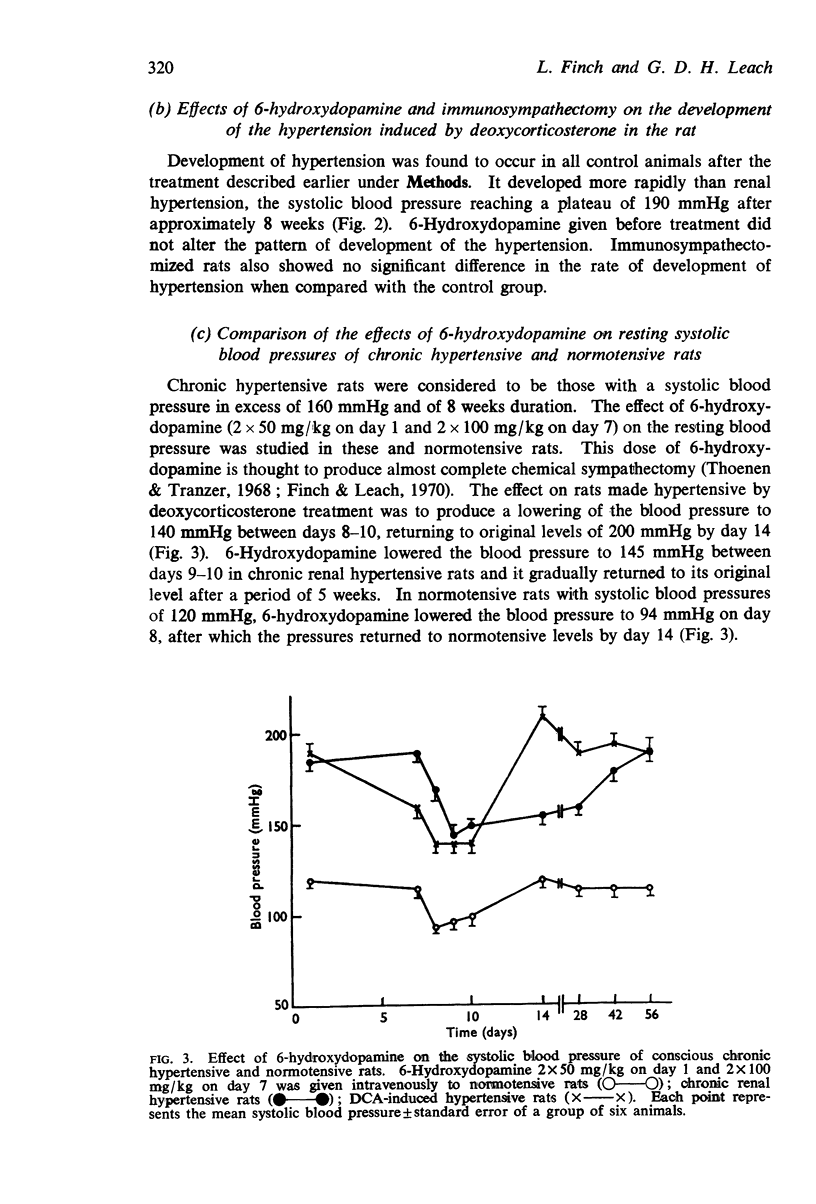
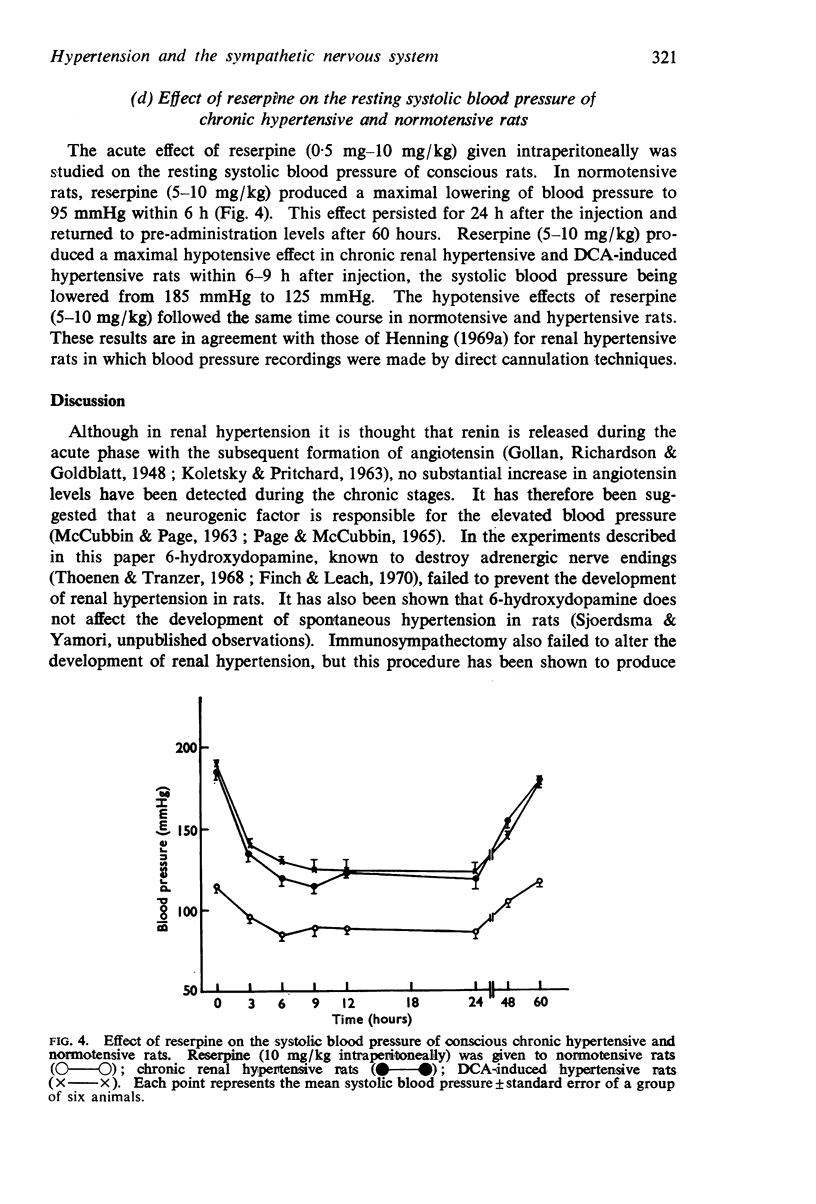
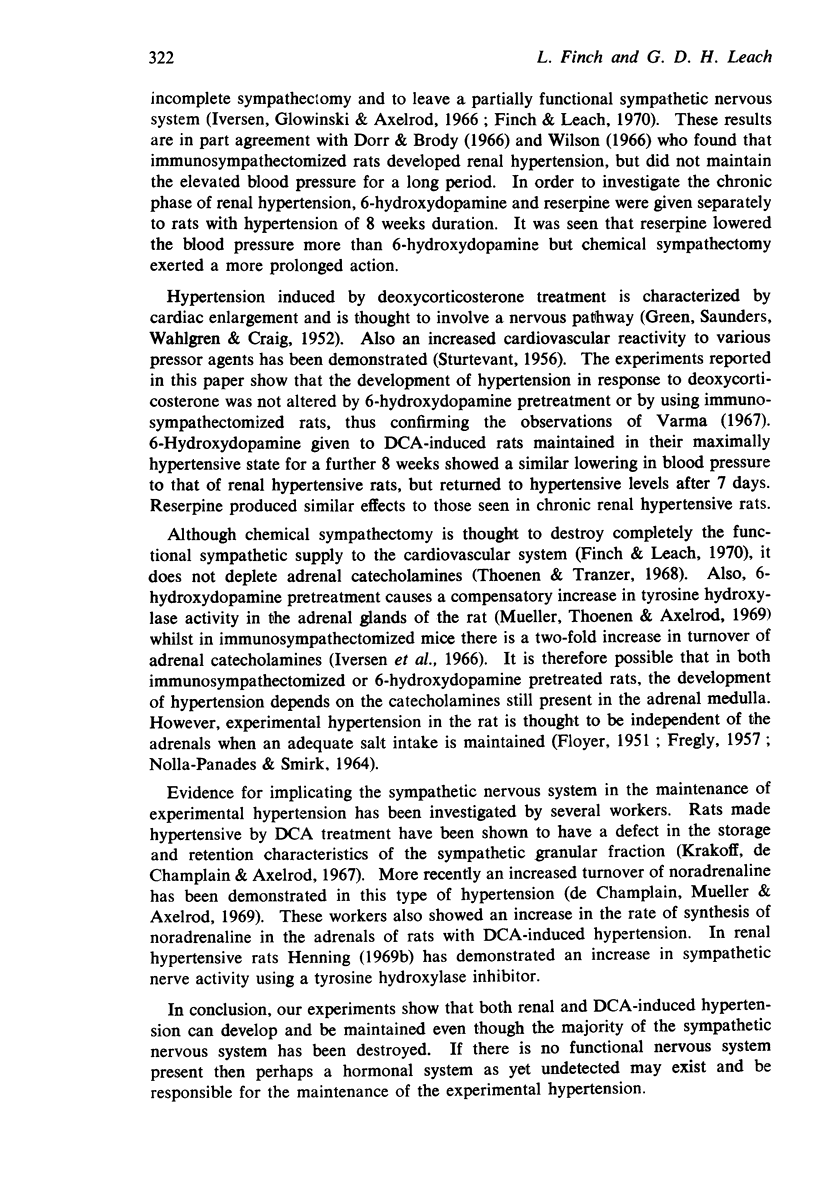
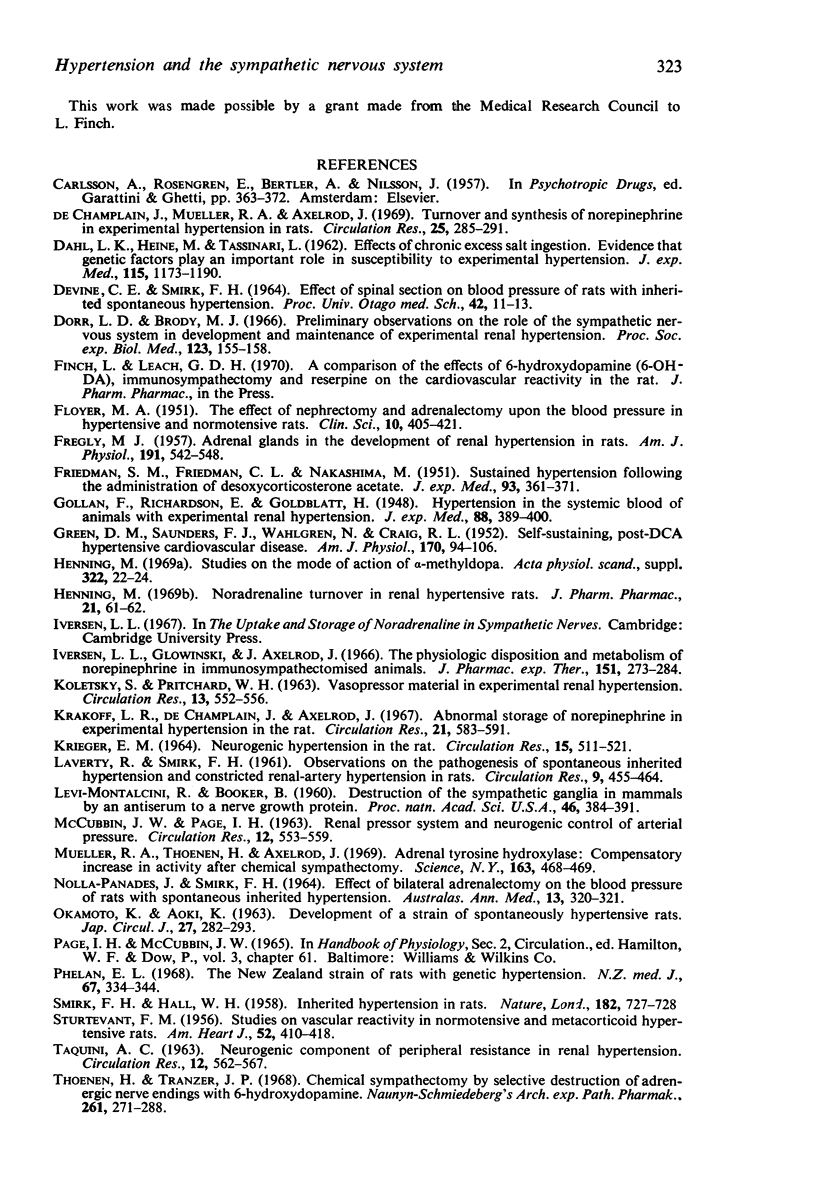
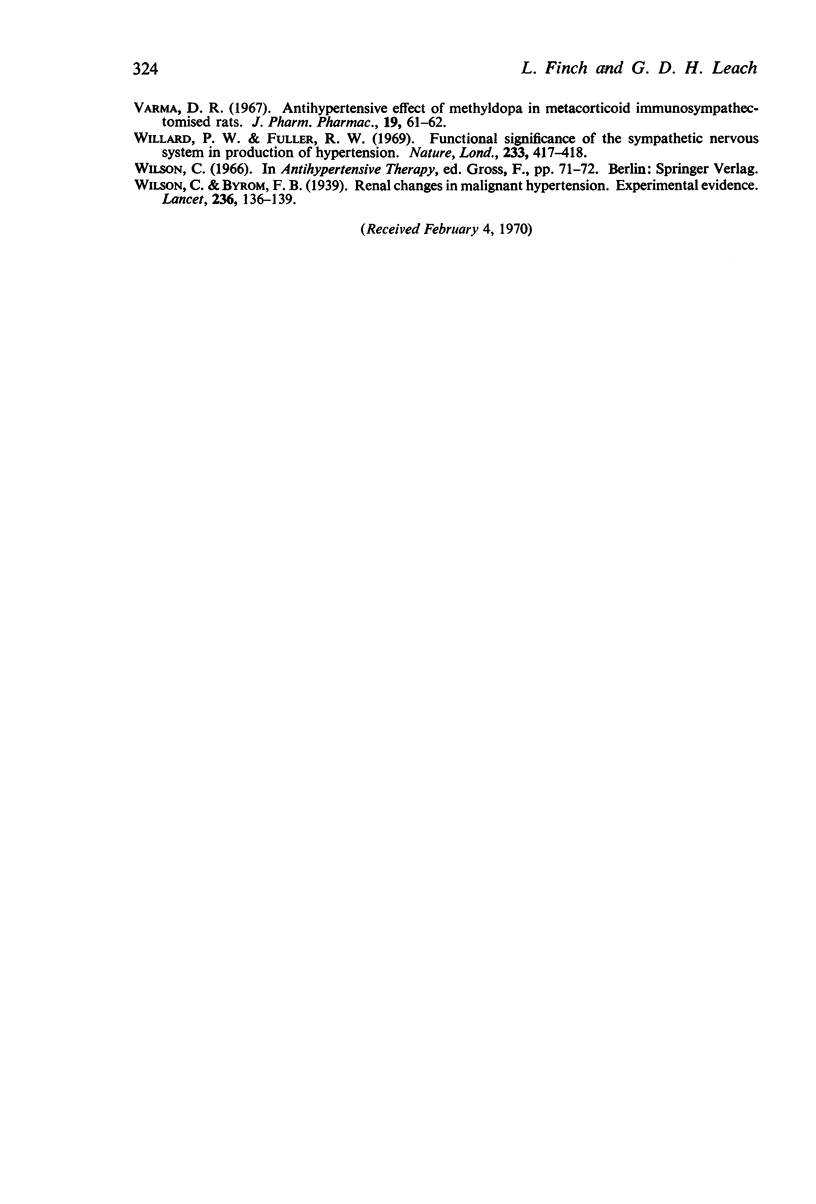
Selected References
These references are in PubMed. This may not be the complete list of references from this article.
- DAHL L. K., HEINE M., TASSINARI L. Effects of chronia excess salt ingestion. Evidence that genetic factors play an important role in susceptibility to experimental hypertension. J Exp Med. 1962 Jun 1;115:1173–1190. doi: 10.1084/jem.115.6.1173. [DOI] [PMC free article] [PubMed] [Google Scholar]
- De Champlain J., Mueller R. A., Axelrod J. Turnover and synthesis of norepinephrine in experimental hypertension in rats. Circ Res. 1969 Sep;25(3):285–291. doi: 10.1161/01.res.25.3.285. [DOI] [PubMed] [Google Scholar]
- Dorr L. D., Brody M. J. Preliminary observations on the role of the sympathetic nervous system in development and maintenance of experimental renal hypertension. Proc Soc Exp Biol Med. 1966 Oct;123(1):155–158. doi: 10.3181/00379727-123-31429. [DOI] [PubMed] [Google Scholar]
- FLOYER M. A. The effect of nephrectomy and adrenalectomy upon the blood pressure in hypertensive and normotensive rats. Clin Sci. 1951 Nov;10(4):405–421. [PubMed] [Google Scholar]
- FREGLY M. J. Adrenal glands in the development of renal hypertension in rats. Am J Physiol. 1957 Dec;191(3):542–548. doi: 10.1152/ajplegacy.1957.191.3.542. [DOI] [PubMed] [Google Scholar]
- FRIEDMAN S. M., FRIEDMAN C. L., NAKASHIMA M. Sustained hypertension following the administration of desoxycorticosterone acetate. J Exp Med. 1951 Apr 1;93(4):361–372. doi: 10.1084/jem.93.4.361. [DOI] [PMC free article] [PubMed] [Google Scholar]
- GREEN D. M., SAUNDERS F. J., WAHLGREN N., CRAIG R. L. Self-sustaining, post-DCA hypertensive cardiovascular disease. Am J Physiol. 1952 Jul;170(1):94–106. doi: 10.1152/ajplegacy.1952.170.1.94. [DOI] [PubMed] [Google Scholar]
- Henning M. Noradrenaline turnover in renal hypertensive rats. J Pharm Pharmacol. 1969 Jan;21(1):61–63. doi: 10.1111/j.2042-7158.1969.tb08136.x. [DOI] [PubMed] [Google Scholar]
- Iversen L. L., Glowinski J., Axelrod J. The physiologic disposition and metabolism of norepinephrine in immunosympathectomized animals. J Pharmacol Exp Ther. 1966 Feb;151(2):273–284. [PubMed] [Google Scholar]
- KOLETSKY S., PRITCHARD W. H. VASOPRESSOR MATERIAL IN EXPERIMENTAL RENAL HYPERTENSION. Circ Res. 1963 Dec;13:552–556. doi: 10.1161/01.res.13.6.552. [DOI] [PubMed] [Google Scholar]
- KRIEGER E. M. NEUROGENIC HYPERTENSION IN THE RAT. Circ Res. 1964 Dec;15:511–521. doi: 10.1161/01.res.15.6.511. [DOI] [PubMed] [Google Scholar]
- Krakoff L. R., de Champlain J., Axelrod J. Abnormal storage of norepinephrine in experimental hypertension in the rat. Circ Res. 1967 Nov;21(5):583–591. doi: 10.1161/01.res.21.5.583. [DOI] [PubMed] [Google Scholar]
- LAVERTY R., SMIRK F. H. Observations on the pathogenesis of spontaneous inherited hypertension and constricted renalartery hypertension in rats. Circ Res. 1961 Mar;9:455–464. doi: 10.1161/01.res.9.2.455. [DOI] [PubMed] [Google Scholar]
- Levi-Montalcini R., Booker B. DESTRUCTION OF THE SYMPATHETIC GANGLIA IN MAMMALS BY AN ANTISERUM TO A NERVE-GROWTH PROTEIN. Proc Natl Acad Sci U S A. 1960 Mar;46(3):384–391. doi: 10.1073/pnas.46.3.384. [DOI] [PMC free article] [PubMed] [Google Scholar]
- Mueller R. A., Thoenen H., Axelrod J. Adrenal tyrosine hydroxylase: compensatory increase in activity after chemical sympathectomy. Science. 1969 Jan 31;163(3866):468–469. doi: 10.1126/science.163.3866.468. [DOI] [PubMed] [Google Scholar]
- NOLLA-PANADES J., SMIRK F. H. EFFECT OF BILATERAL ADRENALECTOMY ON THE BLOOD PRESSURE OF RATS WITH SPONTANEOUS INHERITED HYPERTENSION. Australas Ann Med. 1964 Nov;13:320–321. doi: 10.1111/imj.1964.13.4.320. [DOI] [PubMed] [Google Scholar]
- OKAMOTO K., AOKI K. Development of a strain of spontaneously hypertensive rats. Jpn Circ J. 1963 Mar;27:282–293. doi: 10.1253/jcj.27.282. [DOI] [PubMed] [Google Scholar]
- Phelan E. L. The New Zealand strain of rats with genetic hypertension. N Z Med J. 1968 Mar;67(429):334–344. [PubMed] [Google Scholar]
- SMIRK F. H., HALL W. H. Inherited hypertension in rats. Nature. 1958 Sep 13;182(4637):727–728. doi: 10.1038/182727a0. [DOI] [PubMed] [Google Scholar]
- STURTEVANT F. M. Studies on vascular reactivity in normotensive and metacorticoid hypertensive rats. Am Heart J. 1956 Sep;52(3):410–418. doi: 10.1016/0002-8703(56)90215-0. [DOI] [PubMed] [Google Scholar]
- TAQUINI A. C., Jr Neurogenic control of peripheral resistance in renal hypertension. Circ Res. 1963 May;12(5):562–572. doi: 10.1161/01.res.12.5.562. [DOI] [PubMed] [Google Scholar]
- Thoenen H., Tranzer J. P. Chemical sympathectomy by selective destruction of adrenergic nerve endings with 6-Hydroxydopamine. Naunyn Schmiedebergs Arch Exp Pathol Pharmakol. 1968;261(3):271–288. doi: 10.1007/BF00536990. [DOI] [PubMed] [Google Scholar]
- Varma D. R. Antihypertensive effect of methyldopa in metacorticoid immunosympathectomized rats. J Pharm Pharmacol. 1967 Jan;19(1):61–62. doi: 10.1111/j.2042-7158.1967.tb07998.x. [DOI] [PubMed] [Google Scholar]
- Willard P. W., Fuller R. W. Functional significance of the sympathetic nervous system in production of hypertension. Nature. 1969 Jul 26;223(5204):417–418. doi: 10.1038/223417a0. [DOI] [PubMed] [Google Scholar]


